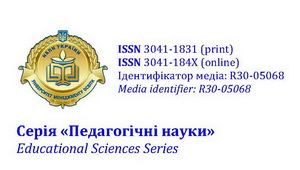The use of modern teaching methods and technologies in general education as a key tool of modernization
Анотація
Ключові слова
Повний текст:
PDF (English)Посилання
REFERENCES / СПИСОК ВИКОРИСТАНИХ ДЖЕРЕЛ
Ə. Ə. Ağayev, Nəsillərə örnək insan. Bakı, Azərbaycan : Mütərcim, 2016.
Ə. Ə. Əlizadə, İstedadlı uşaqlar. Psixopedaqoji məsələlər. Bakı, Azərbaycan : ADPU-nun mətbəəsi, 2005.
Ə. Ə. Əlizadə, Yeni pedaqoji təfəkkür. Bakı, Azərbaycan : Elm, 2011.
H. H. Əhmədov, Azərbaycan təhsilinin inkişaf strategiyası. Bakı, Azərbaycan : Elm, 2010.
M. A. İsmixanov, Pedaqogikanın əsasları. Bakı, Azərbaycan : Təhsil, 2011.
A. M. Paşayev, E. F. Cəfərov, Azərbaycan dili və ədəbiyyat dərslərində interaktiv təlim metodlarının tətbiqi imkanları. Bakı, Azərbaycan : Nurlan, 2015.
R. L. Hüseynzadə, Pedaqogika. Bakı, Azərbaycan : Mütərcim, 2013.
A. O. Mehrabov, A. N. Abbasov, M. C. Mahmudov, Təhsilin modernləşməsinin aktual problemləri. Bakı, Azərbaycan : Mutərcim, 2013.
M. C. Mərdanov, Azərbaycan təhsili dünən, bu gün, sabah. Bakı, Azərbaycan : Təhsil, 2006, 300.
F. A. Rüstəmov, Azərbaycanda pedaqoji elm: təşəkkülü, inkişafı və problemləri (1920–1991-ci illər). Bakı, Azərbaycan : Bakı Universiteti, 2018.
F. B. Sadıqov, Uşaqların bədii yaradıcılıq qabiliyyətlərinin formalaşdırılması işinin elmi-pedaqoji əsasları. Bakı, Azərbaycan : Mutərcim, 2014.
İ. H. Cəbrayılov, Təhsilin modernləşməsinin elmi-nəzəri problemləri. Bakı, Azərbaycan : Mutərcim, 2015.
TRANSLATED AND TRANSLITERATED / ПЕРЕКЛАД, ТРАНСЛІТЕРАЦІЯ
A. E. Agaev, Model Personality for Generations. Baku, Azerbaijan : Mutardzhim, 2016.
A. E. Alizade, Gifted Children: Psychological and Pedagogical Issues. Baku, Azerbaijan : ASPU Printing House, 2005. (in Azerbaijani).
A. E. Alizade, New Pedagogical Thinking. Baku, Azerbaijan : Elm, 2011. (in Azerbaijani).
Kh. Kh. Ahmedov, Strategy for the Development of Azerbaijani Education. Baku, Azerbaijan : Elm, 2010. (in Azerbaijani).
M. A. Ismikhanov, Fundamentals of Pedagogy. Baku, Azerbaijan : Prosveshchenie, 2011. (in Azerbaijani).
A. M. Pashayev, E. F. Jafarov, Possibilities of Applying Interactive Teaching Methods in Azerbaijani Language and Literature Lessons. Baku, Azerbaijan : Nurlan, 2015. (in Azerbaijani).
R. L. Guseynzade, Pedagogy. Baku, Azerbaijan : Mutardzhim, 2013. (in Azerbaijani).
A. O. Mehrabov, A. N. Abbasov, M. Ch. Mahmudov, Current Problems of Education Modernization. Baku, Azerbaijan : Mutardzhim, 2013. (in Azerbaijani).
M. Ch. Mardanov, Azerbaijani Education: Yesterday, Today, Tomorrow. Baku, Azerbaijan : Education, 2006, 300. (in Azerbaijani).
F. A. Rustamov, Pedagogical Science in Azerbaijan: Its Formation, Development, and Problems (1920–1991). Baku, Azerbaijan : Baku University, 2018. (in Azerbaijani).
F. B. Sadygov, Scientific and Pedagogical Foundations of Work on the Development of Artistic and Creative Abilities of Children. Baku, Azerbaijan : Mutardzhim, 2014. (in Azerbaijani).
I. H. Jabrayilov, Scientific and Theoretical Problems of Education Modernization. Baku, Azerbaijan : Mutardzhim, 2015. (in Azerbaijani).
Посилання
- Поки немає зовнішніх посилань.
